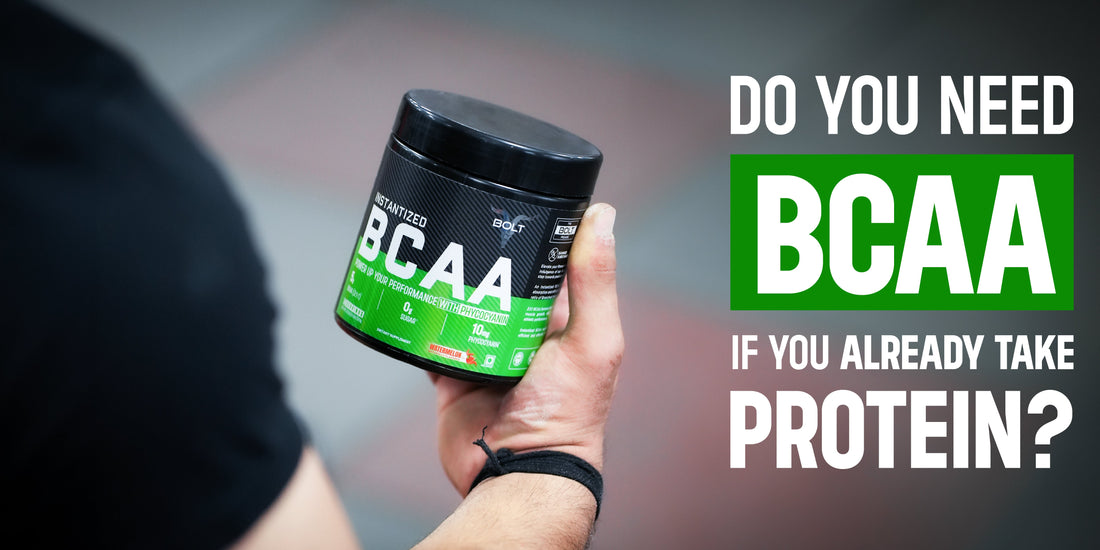
Do You Need BCAA If You Already Take Protein?
byBranched-chain amino acids (BCAAs) and protein supplements are both popular choices for fitness enthusiasts looking to enhance muscle growth, recovery, and performance. But if you're already taking a high-quality protein supplement, do you really need additional BCAAs?
In this blog, we’ll break down the differences between BCAAs and protein, their benefits, and whether supplementing with BCAAs is necessary.
What Are BCAAs?
BCAAs are three essential amino acids—leucine, isoleucine, and valine—that play a key role in muscle protein synthesis, energy production, and reducing muscle breakdown during exercise.

Since the body cannot produce these amino acids on its own, they must be obtained through diet or supplementation.
Key Benefits of BCAAs
✅ Promote muscle recovery and reduce soreness
✅ Support lean muscle preservation during cutting phases
✅ Help prevent muscle breakdown during fasted training
✅ Provide quick energy for endurance athletes

What’s the Difference Between BCAAs & Protein Powder?
Protein powders (like whey, casein, or plant-based protein) contain all nine essential amino acids (EAAs), including BCAAs, while BCAA supplements provide only three specific amino acids.
|
Feature |
BCAA Supplement |
Protein Powder |
|
Amino Acids |
3 (Leucine, Isoleucine, Valine) |
All 9 Essential Amino Acids |
|
Muscle Growth |
Supports muscle retention |
Supports full muscle protein synthesis |
|
Recovery |
Helps reduce muscle soreness |
Complete recovery support |
|
Calories |
Zero or very low |
Varies (100-150 kcal per serving) |
|
Best For |
Fasted workouts, endurance training, muscle preservation |
Muscle growth, overall recovery, meal replacement |
Do You Need BCAA If You Already Take Protein?
If You Take a High-Quality Protein Powder:
Additional BCAA supplementation is usually unnecessary. Since protein powders already contain BCAAs, you’re getting the necessary amino acids for muscle recovery and growth.
When BCAA Supplementation May Be Beneficial:
✅ Fasted Training – If you work out on an empty stomach, BCAAs can help prevent muscle breakdown.
✅ Low-Protein Diets – If you struggle to meet daily protein needs, BCAAs may provide extra support.
✅ Endurance Athletes – Runners and cyclists may benefit from BCAAs for sustained energy and reduced muscle fatigue.
✅ Cutting Phases – If you're in a calorie deficit, BCAAs can help preserve lean muscle mass.
FAQ – BCAA vs. Protein
1. Can BCAAs replace protein powder?
No! BCAAs lack the full spectrum of essential amino acids needed for muscle protein synthesis. Protein powder is more effective for muscle growth and recovery.
2. When should I take BCAAs?
If using BCAAs, take them before or during workouts, especially if training fasted or doing long endurance sessions.
3. Are BCAAs necessary for muscle growth?
Not if you consume enough complete protein sources like whey, chicken, eggs, or plant-based proteins.
4. Can I take BCAAs and protein together?
Yes, but it’s often unnecessary. If your protein intake is sufficient, extra BCAAs may not provide additional benefits.
5. What’s the best alternative to BCAAs?
If muscle growth and recovery are your goals, a high-quality whey isolate or EAA supplement is a better option.
Conclusion
If you already consume a complete protein source like whey or plant-based protein, additional BCAA supplementation is often unnecessary. However, BCAAs may benefit those training fasted, endurance athletes, or individuals on low-protein diets.
Try Bolt Nutrition’s High-Quality Whey Protein!
For muscle recovery, lean gains, and optimal performance, fuel your body with Bolt Nutrition’s premium whey isolate, packed with all essential amino acids—including BCAAs.








